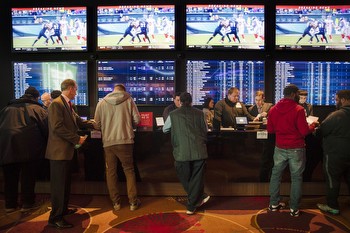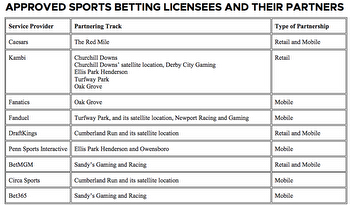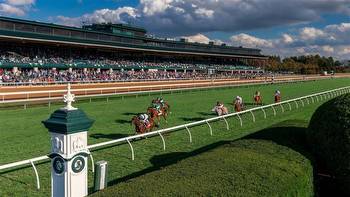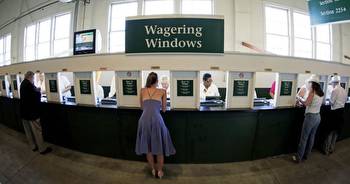A Kentucky Sports Betting Primer

When Kentucky Governor Andy Beshear signed into law House Bill 551 last March, the Kentucky sports gambling bill not only created new opportunities for seasoned sports bettors around Kentucky, but potentially opened sports betting to thousands of casual fans as well.
Although Kentucky’s sports betting law took effect on June 28, its implementation is set to begin in September. The first retail sportsbooks — only available at sanctioned Kentucky racetracks — are set to go live in the state on Sept. 7, and online sports betting will begin Sept. 28.
Bettors said it was about time Kentucky joined neighboring states in offering legal sports betting. No longer will Kentuckians have to hop state lines to place those types of bets.
“I never thought it made sense to keep going over the bridge to Indiana to bet,” said Mickey Hedges, an occasional sports gambler from Frankfort. “And now my cousin up in Covington won’t have to drive over the bridge to Ohio just to bet. It just makes sense for us to do it in our own state.”
Senate Majority Floor Leader Damon Thayer, a Republican from Georgetown, pushed hard for passage of the bill. “Freedom won the day,” said Thayer. “We’re a sports-crazy state and people want to be able to make a choice of their own free will to make wagers on sports events, like almost all of our neighboring states.”
Kentucky is the 38th state to legalize sports betting. State officials estimate sports betting could bring in $23 million in new tax revenue for the state, with most tax proceeds going toward Kentucky’s financially troubled state pension system. By comparison, Thayer said, Tennessee took in an estimated $68 million in sports betting tax revenue last year. He said he looks forward to Kentuckians not crossing over “to spend their money in other states.”
Not everyone favors legal sports betting in the state, however, arguing that it’s a highly addictive form of gambling and that Kentucky families will be hurt when people spend money that they cannot afford to lose on gambling. In response to these concerns, the new law sets aside 2.5% of the state’s gambling tax revenue for addiction programs. A study revealed that more than 100,000 adults in Kentucky displayed problematic gambling traits and 45,000 adults struggled with gambling addiction, according to data from the Kentucky Council on Problem Gambling.
In Lexington, Keeneland and Red Mile Gaming and Racing chose to partner with Caesar’s Sportsbook, the sports wagering platform for Caesars Entertainment. An agreement calls for the racetracks to have access to mobile sports wagering and, at Red Mile, to open a brick-and-mortar retail sportsbook location.
“Keeneland’s venture with Caesars Sportsbook holds exciting potential and furthers our mission to introduce new audiences to horse racing,” said Keeneland president and CEO Shannon Arvin. “Caesars is a globally respected brand.”
“Opportunities with sports wagering on site, added to live racing, simulcasting, and HHR [historical horse racing] games accomplish goals we have worked toward for several years,” said Red Mile chief operating officer Shannon Cobb. “Our relationship with Keeneland and Caesars in this venture could not be more valued.”
To become a licensed betting facility, the racetracks must pay the state an up-front fee of $500,000 and an annual renewal fee of $50,000. Bets placed in person at horse tracks and other physical sites will have an excise tax of 9.75%. Online wagers will be taxed at a higher rate of 14.25%.
The Kentucky Horse Racing Commission (KHRC) is the regulatory body for sports betting activities and has established standards and procedures for operators to obtain and maintain licenses. The KHRC was chosen to govern because it has 114 years of experience in gambling regulation. It hired Hans Stokke as executive advisor. He will build a new department to inspect and enforce state regulations. KHRC representatives have also consulted with gaming officials in New Jersey, Ohio, Colorado, Massachusetts and with Major League Baseball to gain insights.
Kentucky players must be at least 18 years old. However, some betting operators, such as Caesars Sportsbook and FanDuel, require betters to be age 21 or older. Customers can bet on everything from Kentucky Wildcats sports and college sports in general, to the NFL, NBA, Major League Baseball, boxing, NASCAR, pro golf, and a wide variety of other professional sports. With the roll out of gambling in the state slated for early and late September, extra efforts were made to get everything up and running for the NFL season. The NFL draws a tremendous amount of sports gambling. Fans in Kentucky will be able to wager online beginning with NFL Week 4.
Customers will be able to place wagers through licensed Kentucky websites and up to 30 mobile sports betting apps. The more prominent sites entering this competitive marketplace, besides Caesar and FanDuel, include BetMGM, DraftKings, BetRivers, and WynnBET, to name a few.
In addition to Red Mile Gaming and Racing, on-site sports books will also open at Churchill Downs and Derby City Gaming and Hotel in Louisville, as well as other racetracks across the state and at Kentucky Speedway. Betting on horse races will only be allowed in person and through specific online sports race books, such as TwinSpires, TVG, or FanDuel Racing.
When using the online sites or locations, gamblers could have many dozens of betting options within a single contest. For example, customers will be able to study in-game and player information and bet on point spreads (margin of victory) and point totals (known as the over/under). Parlays are popular because they let a person bet on two or more outcomes within a game. Props are side bets when a customer bets on specific aspects of a game or an individual player’s performance, such as a basketball player getting 10 rebounds or a football player rushing for 100 yards or more. Depending on how they play, customers will be eligible for bonuses, odds boosts, and loyalty rewards. It is all designed to keep customers happy and coming back.
High rollers will note that the maximum allowed legal bet in Kentucky will be $5,000. The maximum allowable daily loss will be $10,000.


























